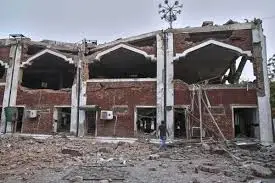NSAs of India and Pakistan in touch; India maintains heightened security, is fully prepared for any advances

India, Pakistan NSAs in Contact; India Boosts Security Readiness Amid Border Tensions
New Delhi, May 8: National Security Advisers (NSAs) of India and Pakistan are reportedly in quiet contact. Meanwhile, India has increased its security along sensitive border areas. Though officials haven’t confirmed these talks publicly, trusted sources say the dialogue aims to manage tension and prevent escalation.
Secret Backchannel Talks
Sources reveal NSA Ajit Doval and his Pakistani counterpart are exchanging messages through informal channels. These quiet conversations offer a way to share concerns and reduce misunderstandings.
India and Pakistan have used such backchannels before. After the Pulwama-Balakot standoff in 2019, similar talks helped ease the situation.
These are not official negotiations. However, they keep communication lines open and allow both countries to manage risks calmly.
India Strengthens Border Security
India has stepped up security along the Line of Control (LoC) in Jammu and Kashmir. Vigilance has also increased in Punjab, Rajasthan, and Gujarat.
The Indian Army and Border Security Force (BSF) are coordinating closely. Troop numbers have gone up, and drone surveillance has intensified.
Officials say they are ready to respond to “any misadventure” from across the border. The move follows increased infiltration attempts and suspicious drone activity.
The Indian Air Force has also begun night patrols and aerial checks in vulnerable zones.
Signs of Caution from Pakistan
Some analysts believe Pakistan is trying to lower tensions. Although its public statements remain firm, internal briefings stress the need for peace.
Pakistan faces high inflation, foreign debt, and pressure from global groups like the FATF. A crisis with India would only add to its challenges.
At the same time, Pakistan’s security forces are dealing with internal unrest. Trouble continues in Balochistan and tribal regions.
India’s Assertive, Prepared Approach
India’s current strategy shows a clear shift. The focus now is on fast mobilization, real-time intelligence, and layered defenses.
NSA Doval has pushed for stronger internal security and better coordination among forces.
At a recent meeting, Home Minister Amit Shah said, “India will not compromise on national security.” He urged forces to act firmly but avoid unnecessary conflict.
India’s defense planners also factor in support from global allies. Countries like the US and France offer intelligence sharing and joint defense cooperation. That has boosted India’s confidence.
Watching China Closely
India’s alertness is not just about Pakistan. Tensions with China near Ladakh also concern Indian officials. The Chinese military has built roads, airstrips, and forward bases along the border.
India wants to be ready for threats from both the west and the east. Some experts say backchannel talks with Pakistan could help reduce pressure on one front.
What These NSA Talks Could Lead To
Backchannel talks might lead to bigger outcomes if they continue. Both sides could slowly take steps toward better ties.
They might restore High Commissioners, reopen trade routes, or release prisoners. But for that, Pakistan must act against groups operating from its soil.
Still, progress won’t be easy. These talks must remain secret to avoid political backlash. Public pressure or media leaks could derail efforts quickly.
Public Reactions and Political Voices
The Indian government hasn’t commented yet. However, opposition leaders want clarity. Some have asked for a briefing in Parliament if talks are ongoing.
In Pakistan, media coverage remains low. The silence likely reflects the sensitive nature of these efforts.
Online reactions vary. Some people feel hopeful, while others remain skeptical. Many remind both governments of the cost of past wars and the value of peace.
Conclusion
The reported contact between India and Pakistan’s NSAs offers a small chance to avoid conflict. India has made it clear: it wants peace but will defend itself fully.
While the road ahead is uncertain, dialogue—however quiet—may help ease the current tension. A firm yet measured approach from both sides could benefit the region and its people.






